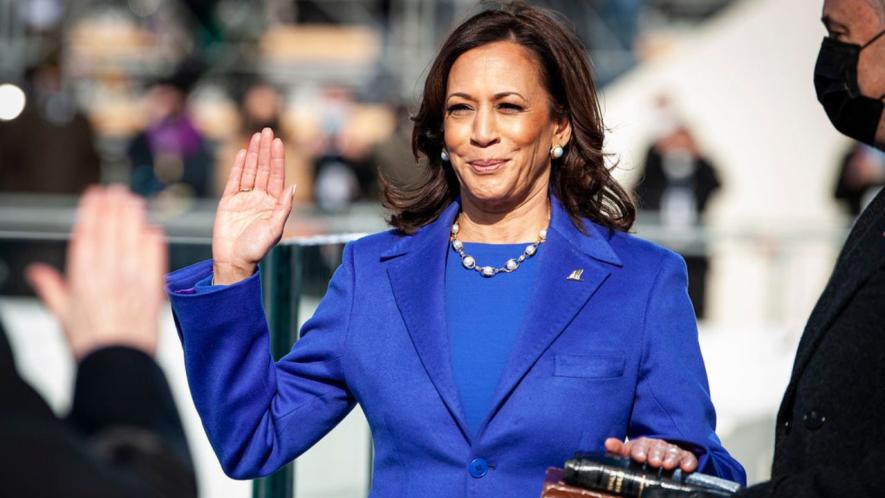US: On Harris’ Plans to Lower Costs for American Families

Image Courtesy: Flickr
The current Vice President of the United States and the nominee of the Democratic Party for President in the November 2024 elections has issued a set of proposals regarding some of her future economic policies if she becomes the next President of her country. The proposals set out by Harris span the realms of housing, healthcare, nutrition and personal taxation. These are couched in the language that is characteristic of neoliberalism. Let us briefly examine each of them.
Significant segments of the working people of the US are unable to either pay rent or buy a house as the neoliberal project has proliferated in the country. Harris aims to tackle this crisis through policy initiatives to increase the number of housing units by three million in the next four years.
These policy initiatives include a tax incentive for homebuilders who sell houses to first time homebuyers, expansion of tax incentive for homebuilders that construct affordable rental housing, increasing subsidies to build affordable homes, reducing tax incentives for corporations that acquire a large number of single-family rental houses, prohibition of a software algorithm driven rent racking by landlords and provision of subsidies for first time homebuyers.
The health system in the US is possibly the most exclusionary among all the developed countries due to historically unprecedented levels of corporate profiteering. It also compares poorly to some developing countries. Many segments of the working people face varying degrees of exclusion from the health system, including medical debt due to incomplete coverage of health insurance, high prices of prescription drugs etc. Harris aims to tackle some of these exclusions by cancelling medical debt, deploy the bargaining power of the government to reduce the procurement prices of medical supplies etc.
Likewise, the US has possibly the highest levels of under-nutrition among the developed countries. A survey carried out in May 2024 unearthed that up to 27% of the people of the United States of America are skipping meals due to high food prices. Further up to 28% of the people of the US are unable to pay rent or bills due to high food prices.
Harris aims to tackle this food crisis by banning price gouging on food products and groceries and enhance regulatory oversight over private monopoly profiteering over food products and groceries. Here price gouging refers to a rise in prices that is happening not due to an increase in either costs or the degree of capacity utilisation (even if the initial inflationary spurt originated from one or both of these factors). In other words, price gouging is due to greater concentration and centralisation of capital on the one hand and greater collusion among firms on the other hand.
As regards personal taxation, Harris seeks to restore and expand a child tax credit (more so for the first year of the child), increase earned income tax credit for low wage employed workers without children and reduce the tax liability for those who pay health insurance premiums under the Affordable Care Act.
None of these policy proposals would be considered radical in any country of the world except the US. Right-wing opinion makers (including her rival Donald Trump) have been quick to deem these proposals as the second coming of “communism”. Why is the US almost unique in this respect?
The ruling class in the US has a long tradition of deploying anti-communism to beat back any challenge to their hegemony. However, this anti-communism was not inconsistent with diverse forms of state intervention including Keynesian demand management and industrial policy more broadly along with an unprecedented expansion of the military apparatus of the government of the US, especially after 1945.
The neoliberal phase of the capitalist system that began in the 1970s, required some significant tweaks in the ideological terrain of this hegemony. Since the raison d’etre of the neoliberal project has been to create more unemployment and precarity through segmenting the working people domestically (and internationally), the neoliberal ideological turn initially sought to manufacture consent for this adverse transition by talking up how competitive markets yield the “best” outcomes.
For instance, there was selective relocation of production capacity of activities that are at the relatively low reaches of the technological ladder from the US (and other metropolitan countries) to principally East Asia and South East Asia (especially China). This selective relocation which was underwritten by the rise to dominance of international finance capital centred in the US achieved two objectives. It increased the profits of multinational corporations based in the metropolis and stabilised inflation by weakening the bargaining power of the working people (and therefore their living standards) in the metropolis (and income deflation in the periphery).
But the underlying thrust of government policy in the US has been consistent though its ideological pretexts have changed. As Robert H Wade points out: “The US state has practised production-focused industrial policy from the early years of the republic, with benefits that by any plausible measure far exceed costs. But since the 1980s, the exchange-focused idea that 'the free market is what works, and having the state help it is usually a contradiction in terms' has been at the normative centre of gravity in public policy discourse. With 'industrial policy' rendered toxic, the state has disguised its production-focused practice, to the point where even non-ideological academic researchers claim that the USA does industrial policy not at all, or badly”.
However, the challenge posed to the imperialist hegemony of the ruling class of the US by the rise of China and the return of Russia has compelled a change in the mode of industrial policy evidenced by the Inflation Reduction Act and CHIPS Act. In other words, China’s rise unlike that of Japan and Germany cannot be attenuated through a new version of the Plaza Accords, voluntary export restraint or effectively delinking German manufacturing from Russian energy given that China exercises effective strategic autonomy. This has resulted in the rise of a different mode of industrial policy in the US to try and achieve de-risking through friendshoring by seeking to reduce the strategic leverage that China currently possess with respect to the ruling class of the US. Those who operate within the ideological terrain of neoliberalism mischaracterise this change in the mode of industrial policy as a return of industrial policy in the US.
The consequent change in the mode of industrial policy has partially undermined the extant ideological terrain of neoliberalism based on free enterprise (through the Inflation Reduction Act and CHIPS Act for instance), free markets (through export controls on China for instance) and free trade (through the trade war against China for instance). This partial undermining of the ideological terrain has called forth two linked responses from the ruling class in the US with respect to the working people: one, neo-fascism represented principally (but not exclusively) by Trump that seeks to drive segmentation of the working people to historically unprecedented levels; second, make small concessions to the working people as represented by (a formal reading of) the proposals of Harris.
The proposals of Harris also seem to be informed by an understanding that de-risking through friendshoring is being decisively hampered by the gargantuan levels of corporate profiteering in all domains of social reproduction such as nutrition, housing, health and education. Therefore, something akin to the proposals of Harris (actually significantly more) are necessary (but not sufficient) if de-risking through friendshoring is not to be a non-starter.
The proposals of Harris also represent a partial shift in the arena of political party discourse in the US. Till now, the leadership of the Democratic Party has sought to utilise identity politics (since consistent anti-racism for instance cannot eschew the economic domain) to try and electorally confront the neo-fascism of Trump (while increasingly conceding to the latter as far as economic policies are concerned). This allowed the Trump led Republican Party to position itself ostensibly as the party of White working people by explicit propagation of racism (that is a principal plank of segmenting the working people in the United States of America) while opposing all relevant policies for the working people (such as increasing the minimum wage, universal health insurance cover etc.). After a long time, the proposals of Harris represent a (very limited) attempt by the Democratic Party to confront the neo-fascism of Trump in the economic domain.
Even if Harris becomes the next President of the US, the political system (including a future President Harris) has enough means (evidenced by their handling of the protests against the ongoing Israeli settler colonialist genocide against Palestine) to further water down or prevent the proposals from being meaningfully implemented. But that would also make de-risking through friendshoring ephemeral. However, these proposals are an opening for the Left in the US to centre the struggle against neo-fascism on the livelihood of the working people thereby allowing for the beginning of a unified resistance to neoliberalism.
The writer is professor, department of economics, Satyawati College, University of Delhi. The views are personal.
Get the latest reports & analysis with people's perspective on Protests, movements & deep analytical videos, discussions of the current affairs in your Telegram app. Subscribe to NewsClick's Telegram channel & get Real-Time updates on stories, as they get published on our website.
























